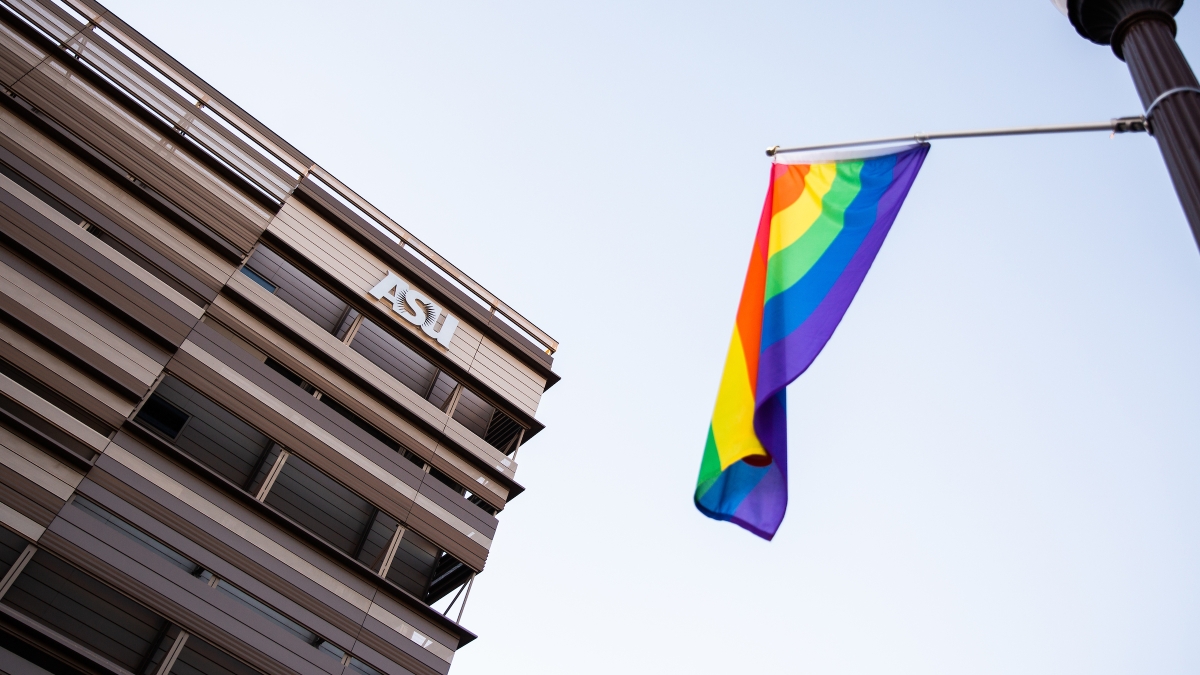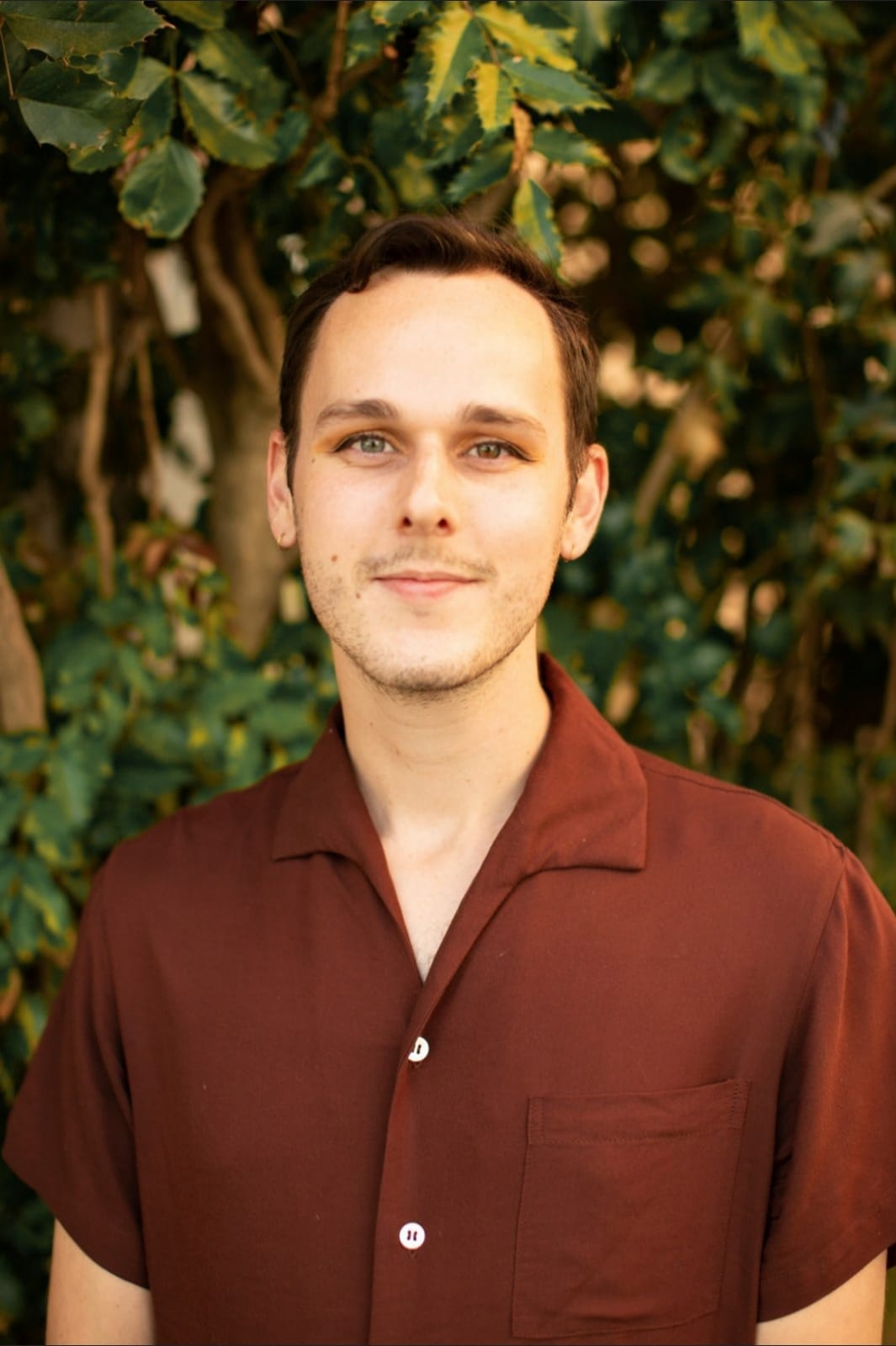How does a job candidate know whether a company is authentically LGBTQ-friendly?
A 2019 survey of 70 companies by the U.S. Chamber of Commerce found that while 93% had a formal written statement barring discrimination based on sexual orientation and also offered same-sex benefits coverage, only 45% had targeted efforts to recruit LGBTQ employees.
StandOUT, an organization for MBA students at Arizona State University, helps job candidates navigate the process of finding a good fit. Group members include queer students and straight allies.
Andrew Logan, the incoming president of the club, which was formed in 2018, said that StandOUT helps queer people find their way to feeling safe in their workplace — and in the classroom.
Andrew Logan, the incoming president of StandOUT, will be start the second year of the full-time MBA program in the fall.
“You don’t want to end up at a company where you’re passed up for promotion or stereotyped or tokenized as a diversity hire,” said Logan, who is interning at Medtronic this summer before starting his second year in the full-time MBA program in the W. P. Carey School of Business at ASU.
Logan answered some questions for ASU News:
Question: Why did you choose ASU?
Answer: I did my undergraduate degree in business, and right after graduating, I joined the Peace Corps and worked as a health and agricultural volunteer in Tanzania. I felt so passionate about the projects I did around health equity and education.
After my Peace Corps service, I had an opportunity to work with an international NGO in global health and technology. I worked with doctors and engineers to develop a mobile app to deliver care.
As I was working in that job, I kept looking at possibilities and they all required an MBA, and I realized I wanted to go back to school so I could make an impact with the work and help people.
I looked at different schools of different sizes and ASU stood out because it was a smaller program and it was in Arizona, where it was sunny all the time. I got such a great energy and had great conversations with everyone from ASU, from former students to administrators and faculty.
Q: How does StandOUT help queer MBA students at ASU?
A: StandOUT is trying to accomplish things in three main areas.
The first is social. Last year, we hosted a weekly viewing of “RuPaul’s Drag Race” and invited other students. It was a great opportunity to share queer culture in America with people who may not have had any exposure to it. We had international students joining us and American students who had never seen it. It was a fun way to relax.
Another area we focus on is meeting the needs of queer students within our program, such as one-on-one mentorship. The second-year students meet with the first-year students to develop relationships and a sense of community. We ask what they need, and whether they need help in finding LGBTQ-friendly companies and whether they have questions about navigating their identity in the classroom.
We’ve also built strong partnerships with operations and admissions teams in W. P. Carey. We talked about creating Safe Zone trainings to incorporate elements of queer identity, and we were able to speak at two Safe Zone trainings for faculty about how to create a safe zone in the classroom, giving our perspective as students with an LGBTQ lens.
With admissions, we’re talking about hosting events for prospective and admitted students to know what we do for diversity, equity and inclusivity at W. P. Carey. It’s about, “How do you recruit LGBTQ students and how do you signal to prospective students that we are an LGBTQ-friendly place and queer students like being here?”
The third area is about engaging with the community. We are meeting with the board of Phoenix Pride and seeing how we can take part in that in the fall. We’re also trying to connect with local LGBTQ nonprofits to host a fundraiser this next school year to help them out and offer our experience, such as consulting services.
Q: How do you help queer MBA students navigate the workplace?
A: We expose them to a lot of resources out there, such as organizations like Reaching Out MBA, a national organization for queer MBA students that has a national conference and a fellowship program.
We also connect them with our network, asking faculty and other people we know, “I have a student interested in this company and do you know any LGBTQ people in this company or other networking opportunities?”
We expose them to other resources they may be interested in, such as any pride organizations within companies. There are a lot that exist within the Fortune 100.
Q: What are the challenges LGBTQ students might face when looking for the right workplace fit?
A: The challenges are, “Will this company be a safe place for me to work? They may talk the talk but do they walk the walk, and how do I know that?” That’s where the connection with people inside the organization comes in, to get that firsthand experience.
Sometimes you wonder, “Will I be able to be my authentic self? Do I see myself fitting in?”
With a lot of queer students, there’s a lot of anxiety about that.
A lot of students don’t have the experience or skills to have those types of conversations in a professional workplace. The time to learn that is in MBA school. We want to equip people with the questions to ask in informational interviews and networking events that are low stakes.
Q: What are some questions they could ask?
A: From my personal experience, I always ask, “Do you have a pride network? Is there a resource group within the company and what kind of initiatives are they about? Social stuff? Community-based stuff?”
If I’m talking to another queer person at that company, I ask, “What is your experience? Have you run into any challenges yourself? Do you feel you have a space to say something if something needs to change and do you feel your company is open to that change?”
Q: What was your Peace Corps experience like as a queer person?
A: That was very challenging. I lived in Tanzania, where it was illegal to be gay. I had to hide that part of my identity while I lived there. I had a lot of anxiety about it.
Coming back to the U.S., and to this program and StandOUT, I was reflecting about my experience in Tanzania. I didn’t want to relive that, so I thought about how I could learn and empower myself as I’m going through the recruitment process and talking to companies. I translated that to wanting to help other people do the same thing.
My personal experience came from that challenging time in Tanzania and having to live a lie. I didn’t make me feel good and I didn’t want anyone to ever feel that way in my workplace.
That’s why I’m so motivated to do that work within the club.
Contact the organization at standoutmba@gmail.com. For more resources for LGBTQ students, visit Out @ ASU.
Top image: A Pride flag in downtown Tempe, Arizona. By Deanna Dent/ASU News
More Business and entrepreneurship

Honoring 2 decades of entrepreneurial impact on a global scale
Thunderbird for Good, the impact-driven initiative of Thunderbird School of Global Management at Arizona State University, is marking two decades of educational programs and initiatives dedicated to…

ASU and GoDaddy launch Student Athlete Venture Studio
In a groundbreaking initiative aimed at empowering college athletes beyond their playing careers, Arizona State University and GoDaddy teamed up to launch the first-of-its-kind Student Athlete…

Boosting entrepreneurship to meet the market's needs
America loves an entrepreneur — the home run king of all businesspeople.And at Arizona State University, we love them, too.Here’s a look at how ASU prepares business students, alumni, development…



